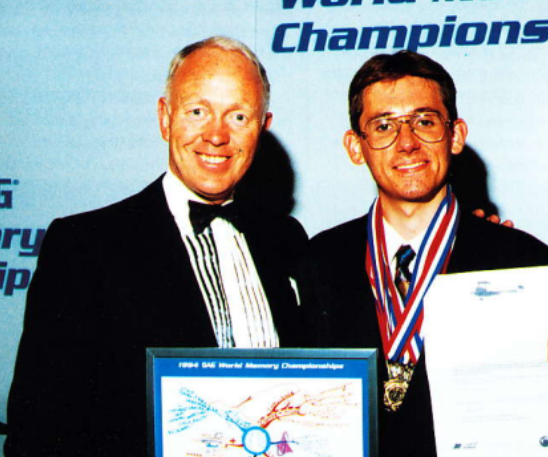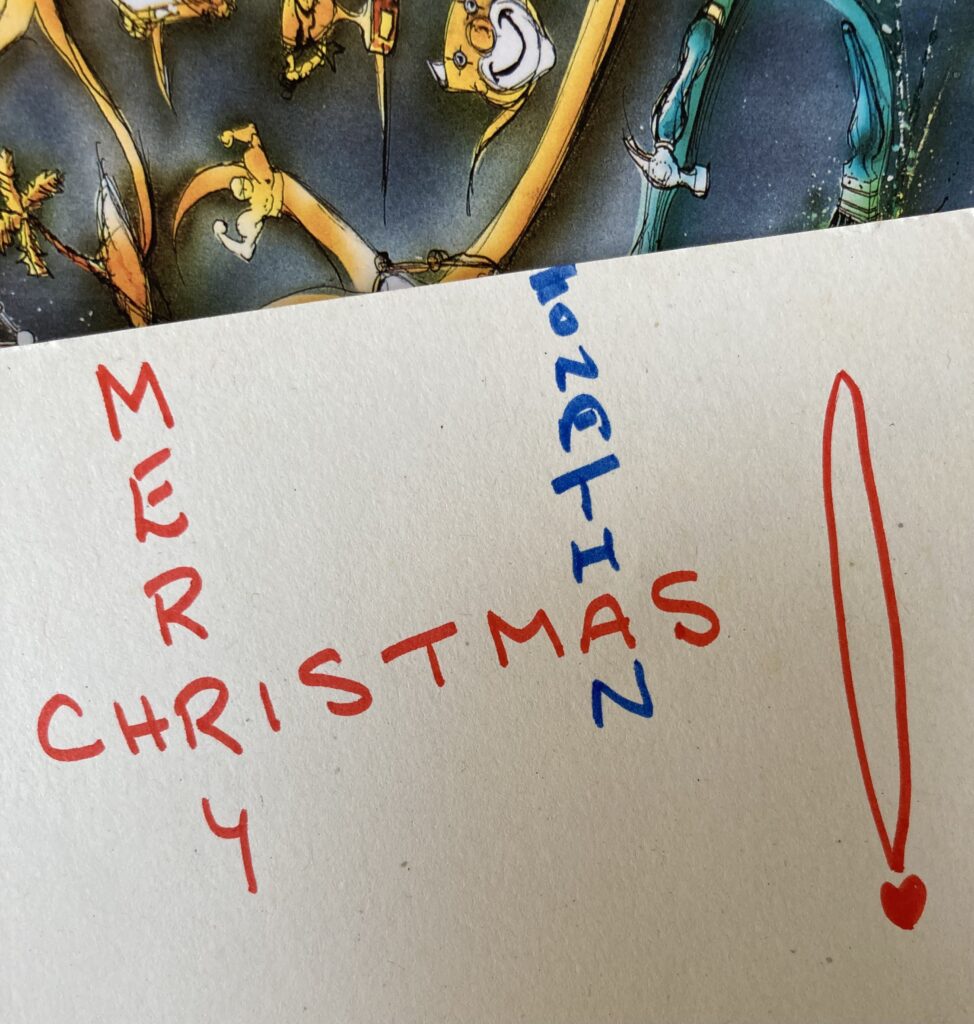Who's the most creative person you know? Someone who revels in generating clever and quirky ideas, with an endlessly inventive outlook and a wide spread of interests. Who surprises you with the connections they make and the solutions they come up with. Someone who just thinks differently.
When I listened to the latest Expert Voices episode, "How to Be Creative," one person came to my mind again and again. He's a man I got to know well, and whose creativity I witnessed at close quarters many times.
He's also someone who gained international fame for his creativity: the Mind Maps inventor, best-selling author, poet, showman, and all-round creative dynamo, Tony Buzan.
I first heard about Tony Buzan when I was at school. In a study-skills lesson, our teacher explained Mind Mapping – the creativity tool that Tony had named and popularized.
I took to Mind Mapping immediately. It was a very effective way to explore ideas, stimulate understanding and creative thinking, and boost memory. Mind Maps helped me in my studies, particularly when exams came around. I also used them to solve problems and plan activities in my own time.
I got hold of several other Buzan books, and his tips and techniques played a big part in developing my fascination with thinking and learning.
So I felt quite star-struck when, a few years later, I got to meet the man himself.
I'd entered a competition that Tony Buzan had helped to organize, and I spent a whole day watching him charm, amuse, entertain, and impress participants and audience members alike.
I finished the day as a medalist, and suddenly I was being interviewed alongside Tony himself – and then going to a restaurant with him and some of the other winners.
He was a fun and fascinating man to be around. And that was just the first of several dinners we had together, because we stayed in touch and talked, worked and even performed together a number of times after that.

For me, Tony Buzan was the embodiment of creativity. With a twinkling smile, bright eyes, and flamboyant, fast-moving hands, he shone with creative energy. It allowed him to produce a vast amount of ground-breaking work, and also to promote his ideas passionately – and empower creativity in others. Because he was convinced that everyone should and could be more creative.
That's a big theme in "How to Be Creative." Chris Lewis, founder of one of the largest independent marketing and communications agencies in the world, tells my colleague Rachel Salaman that "… problem solving is something everybody needs to do these days."
In the words of lawyer-turned-entrepreneur Jonathan Fields, "The truth is, we're all creative, we all create on very intense levels throughout our day."
And author Linda Rottenberg says that we need to throw off any worries about doing the wrong thing, and just let our creativity loose. "We can do it! We can zig when everyone else zags!"
Tony certainly loved to challenge convention. He saw Mind Mapping as a way to revolutionize note taking and list making. But it was also as a way to be more challenging, to uncover new possibilities, to think differently. And for him, the key to creative thinking was connectivity.
Mind Maps use connections to improve understanding, but also to allow new ideas to emerge. And Tony was just as interested in personal connections, keen to swap ideas with anyone and everyone.
In the podcast, Thomas Wedell-Wedellsborg talks about connecting with people from different departments, to "spin off new ideas." "Good ideas tend to come when new worlds meet," he says. That would have made Tony smile. I remember being at a dinner with him once, and seeing him in deep discussion with a waiter about methods for keeping food warm. The next moment he was talking about environmental policy with a member of European royalty.
I'm sure that Tony would also have agreed with author and speaker Josh Linkner, who talks to Rachel about "gobbling up creative inputs" to fire his inventiveness. "I'm absorbing the creativity of others to get my juices flowing," he says.
Tony seized every opportunity to widen his experiences and enrich his knowledge. Once, we were traveling together and he dropped a pile of newspapers into my lap. He had his own set, and instructed me to read the sports, showbiz and even the gossip articles as eagerly as those about politics, the environment or the arts.
As Thomas Wedell-Wedellsborg says in the podcast, "The second you start learning something that's different from your own world, that's when you start to get inspired."
Mind Tools Expert Voices is the podcast series where we delve into our 200+ Expert Interviews, to explore a particular question or theme.
In episode six, "Be More Creative," host Rachel Salaman hears some of the secrets of highly creative people from experts including Melanie Katzman, Josh Linkner, April Rinne, and Rowan Gibson.
For Tony Buzan, it was important to break away from conventional ways of thinking and doing. If the food he fancied wasn't on a restaurant menu, for example, he'd simply invent a dish and explain the ingredients and method to the chef.
Once when were on a radio show together, the presenter explained the format. Tony said, "OK, but why don't we do it like this instead" – then got the host to agree to a completely different – and much better – approach.
Not everything he did worked, but he never let anxiety hold back his creativity. This chimes with what futurist April Rinne tells Rachel about not fearing the worst, and not trying to control everything. If we do that, she says, "We're blinding ourselves. We're leaving opportunities on the table – not seeing all of the amazing things that could happen as well."
Having said that, Tony did need to control some things. He organized his time ruthlessly, and followed several strict routines every day. In the podcast, Jonathan Fields talks about "certainty anchors" – routine actions that free up other parts of your brain for creativity – and Tony was a big believer in these, particularly when he was writing. Several times, when I phoned him, one of his secretaries told me in no uncertain terms that he wasn't to be disturbed. I got to know when he'd be at his familiar desk, with the right stationery, for an agreed length of time – and that he'd only phone back when that particular routine was done.
Jonathan Fields also tells Rachel about the link between good physical health and high-quality creativity. "Mens sana in corpore sano" – "a healthy mind in a healthy body" – was practically Tony's catchphrase. He loved martial arts, worked with Olympic rowers, and was delighted to hear that I'd taken up running.
As Jonathan Fields says, "There's tremendous research around the impact of movement and meditation on the creative process, on cognitive function, on problem solving, on creativity."
There are descriptions of creativity throughout Expert Voices that could have been written about Tony Buzan. But perhaps the one that chimes most with me is about fun. Chris Lewis calls it "the tragedy of the modern workplace" that so many people don't enjoy what they're doing, when creativity and happiness are so closely linked. And Tony laughed a lot. He loved wordplay, told hilarious stories, and found a funny side to almost any challenge.
Once, when our taxi was stuck in a traffic queue, he joked with the driver about a ridiculous shortcut... which sparked an idea... which got us where we needed to be with seconds to spare!
The message that comes through this podcast is that we can all be more creative. By having the confidence to think unconventionally, the energy to make connections, the commitment to our intellectual and physical development – and by having fun while we're at it – we can boost our creativity, and benefit from it in everything we do.
And in my life, no one has proved that more conclusively than the marvelous and much-missed Tony Buzan.

Mind Tools Club Members and Corporate Licensees can listen to the full Expert Voices podcast now.
If you're not a Mind Tools member, you can join the Mind Tools Club and gain access to our 2,400+ resources, including a range of audio features. For corporate licensing, ask for a demo with one of our team.
Which creative characters have been inspirational in your life? Who best represents creativity to you and what have you learned from them? Please share your examples, experiences and insights, below.

Mind Tools writer Jonathan Hancock has gone back to the microphone – and brushed up his broadcasting skills – to launch our new Expert Voices podcast.
"Get yourself a notebook. Every day, write down three problems that you observe. This can be the place where you drive and foment your own change."
Calm people tend not to display worry or anxiety in difficult situations, and they're often reliable decision-makers or confident, strong leaders